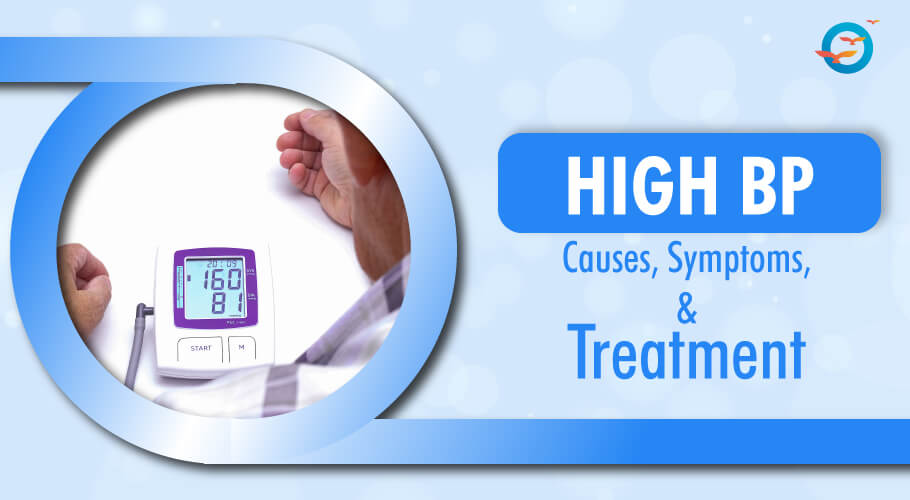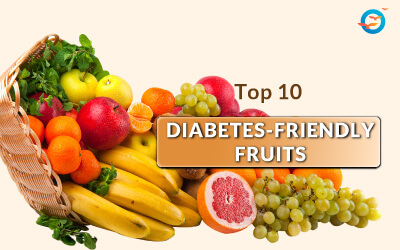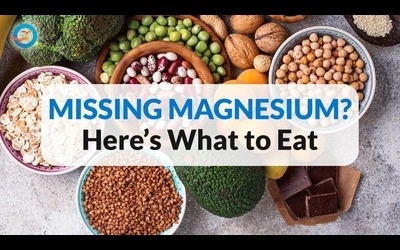High Blood Pressure: Causes, Symptoms & Treatment- FFD

Blood Pressure—Everyone Has It!
Every living person has blood pressure. Blood Pressure (BP) is simply a measurement of the force with which blood is pumped by the heart through the blood circulatory system. This is normal and essential. The problems begin when the pressure builds up.
This can happen when cholesterol plaque builds up on the artery walls, effectively narrowing the arteries, and, as a consequence, increasing the pressure of the blood flow. Since the action of the heart, which pumps the blood is an alternate squeezing and relaxation movement, BP measurement is taken at both points.
This is why your BP is always shown as one number over another, e.g. 80/120. The unit of BP measurement is mm/hg (millimeters of mercury)
- The top number, aka, systolic pressure, tells us the pressure in your arteries when your heart beats
- The bottom number, aka, diastolic pressure, tells us the pressure between beats.
Causes
High blood pressure types are classified as primary (essential) or secondary
1. Primary high blood pressure
Primary high blood pressure is not caused by an underlying ailment. It is usually the result of unhealthy lifestyles—diet, exercise, stress, genetics, etc. and some other factors as under:
- Age (older populations, people above 60 are more prone to high BP)
- Diabetes
- Excessive salt consumption
- Over consumption of caffeine
- Being overweight
- Alcohol abuse
- Less physical activity
- Lack of proper sleep
- Genetics
It is possible to reverse primary high blood pressure by correcting improper lifestyle habits.
2. Secondary blood pressure:
Unlike primary BP, secondary blood pressure is caused by a specific medical condition—or medication. Some known causes of secondary BP are:
- Diseases related to the adrenal gland
- Kidney disorders
- Obstructive sleep apnea
- Preeclampsia
Certain medications (For instance, a group of drugs known as NSADs-- Non-steroidal anti-inflammatory drugs. These medicines are commonly used as pain relievers, to reduce inflammation, for fevers, pains, etc.
Symptoms
Hypertension shows almost no symptoms until the condition is in an advanced stage, which is why it has been described as a silent killer. Prevention is definitely the safest approach. Adults over 40 should make it a practice to get their BP checked routinely; younger adults, between 18 and 39 can get their BP checked once a year. You don’t need to even visit the doctor; any medical professional can take your BP.
It is advisable to take at least 2-3 readings to rule out any situational fluctuations (White coat syndrome, for instance, is the temporary rise in BP at the sight of the doctor’s while coat). Doctor’s visits include a medical history review, which is needed to rule out any possibility of secondary BP
Although there are usually no overt symptoms, over time, as blood vessel damage begins to affect body functions, one may notice issues such as:
- Bloody discharge in the urine (known as hematuria)
- Blurred vision
- Nose bleeds
- Pain in the chest or shortness in breath
- Intense headaches
- Dizziness
- Constant fatigue
- Fugue-like condition
Treatment
Treatment for primary hypertension treatment usually comprises lifestyle changes, supported by medicines, where indicated.
Lifestyle-related treatment
Normalizing primary BP requires patients to adopt healthy lifestyle routines, for instance:
- Diet—reduce intake of fat, animal dairy products, and salt, increase veggies, fruits, nuts, legumes, etc.; moderate alcohol use
- Get regular exercise—45 minutes to an hour of exercise every day. Your routine should include strength training, cardio/aerobic training, and flexibility & balance movements
- Stress release: you should also incorporate stress management techniques, such as daily meditation, into your routine
- Stop tobacco use
- Get sufficient sleep—about 8 hours, every night
Medicine
In addition to the above, your doctor may also prescribe medicines to reduce BP. These drugs can be as follows:
- Beta-blockers:
These medicines slow the heart rate effectively reducing output, and reducing blood pressure. - Vasodilators:
Vasodilators are medicines that help relax muscles in blood vessel walls. This makes blood flow easier. - Calcium channel blockers:
They reduce the quantity of calcium in blood vessels, helping muscle tissues to relax. - Angiotensin-converting enzyme (ACE) inhibitors:
These drugs reduce the production of a protein named angiotensin, which raises your blood pressure. - Angiotensin II receptor blockers (ARBs):
Medications to avoid blood vessel narrowing - Diuretics:
Diuretics eliminate excess water and sodium, which reduces B
High BP Complications
Untreated hypertension will eventually cause a number of health issues, mostly as a result of atherosclerosis—narrowing of arteries caused by plaque on the walls of blood vessels. Such narrowing forces the heart to pump harder in order to circulate the blood. As a result, it can lead to issues such as
- Aneurysms—bulges in arterial walls, which can burst under pressure
- Cardiac arrest/attacks
- Kidney disease/ failure
- Brain stroke
- Hypertensive-related retinopathy. This can cause blindness
Who’s at Risk?
It is relatively straightforward to judge risk factors, if you fit into any of the below categories, you should ensure you monitor your BP closely.
- Older than 60 years of age:
With age, blood pressure steadily increases, as arteries stiffen and narrow due to plaque buildup - Excess weight:
Obesity is a big primary risk factor for high BP - Use of tobacco & alcohol:
Regular and over-consumption of alcohol or tobacco are shown to increase blood pressure. - Underlying health problems:
Medical issues, such as heart disease, diabetes, kidney disorders, and high cholesterol can lead to hypertension - Ethnicity:
Unfortunately, all ethnicities are not equal when it comes to hypertension. Studies show that some, such as African Americans, are at higher risk. - Sex:
Studies show that men are more likely to suffer from high BP; but after 60 it’s a pretty even field with women being equally, if not more, prone to hypertension
Holistic treatment for Complete Reversal
Primary hypertension can be completely reversed if the person follows a complete lifestyle change. At FFD, we describe this as a Holistic Transformation, and our Holistic Transformation Program, does exactly this, through a phase-wise, step-by-step process guided by four fundamental protocols: diet, exercise, stress release, and medication. For more information on our programs and the protocols that drive our programs, visit www.freedomfromdiabetes.org or any of our social media channels, including Facebook / Instagram and YouTube.
FAQ's
1. What are the main causes of high blood pressure?
- Lifestyle factors: Poor diet (high in salt, processed foods, and unhealthy fats), lack of physical activity, smoking, and excessive alcohol consumption are major contributors to hypertension.
- Chronic stress: Ongoing stress can raise blood pressure over time.
- Obesity: Excess body weight puts additional strain on the heart, leading to higher blood pressure.
- Genetics and age: A family history of hypertension and aging increase the risk.
- Underlying health conditions: Diabetes, kidney disease, and sleep apnea can also cause elevated blood pressure.
2. What are the common symptoms of high blood pressure?
- Often asymptomatic: High blood pressure is commonly referred to as a "silent killer" because most people experience no symptoms.
- Severe cases: If blood pressure is extremely high, symptoms may include headaches, dizziness, shortness of breath, chest pain, or blurred vision.
- Complications: If left untreated, it can lead to more serious symptoms like heart attack, stroke, or kidney damage.
3. What treatments are available for managing high blood pressure?
- Lifestyle changes: A balanced diet rich in fruits, vegetables, and whole grains, regular exercise, weight management, and stress reduction techniques (like meditation or yoga) are foundational treatments.
- Dietary approach: The DASH diet (Dietary Approaches to Stop Hypertension) is often recommended for controlling high blood pressure.
- Medication: Doctors may prescribe antihypertensive medications, such as diuretics, beta-blockers, ACE inhibitors, or calcium channel blockers.
- Natural or holistic treatments: Techniques like intermittent fasting, mindful eating, or adopting plant-based diets are often suggested in functional approaches like FFD to manage or even reverse high blood pressure.
Regular monitoring and maintaining a healthy lifestyle are key to long-term management of hypertension.


